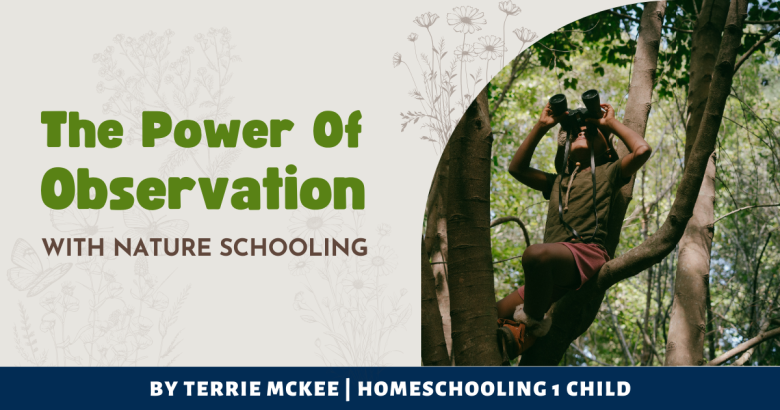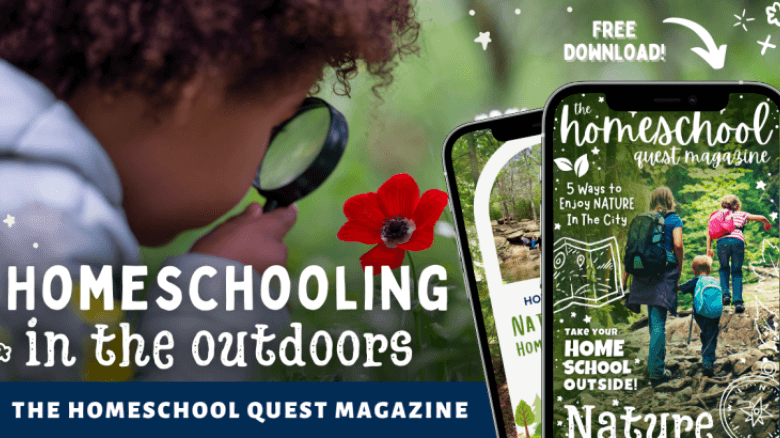By Terrie McKee of Homeschooling 1 Child
Homeschooling offers many paths and opportunities to home educate your child, and just one of those opportunities involves exploring the world around us in nature.
Nature schooling doesn’t involve buying a box load of curriculum—just a keen eye of observation and the willingness to learn using nature.
Nature schooling, like homeschooling, can be as complicated or as easy as you want it to be. It can involve simply going to a park that has woods or grassy area, and exploring them together.
It can mean hiking in the mountains or digging in the sand at the beach. It can also be done by just going in your own backyard. Grab a gardening trowel and dig up a little patch of soil: what creatures do you see? Earthworms? Grubs? Ants? What behaviors do you see?
The most important part, no matter where it’s done, is to have a keen eye for observation.
Beach Walk
If you’re going to the beach this summer, ask your child if he or she would like to go on a beach walk with you.
Look for seashells; when you find a particularly interesting one, ask your child questions: what kind of animal do you think would use this for their home? Why do you think the shell is cracked? Feel the ridges; what do you think makes them?
Your open-ended questions will encourage your child to ask you questions too, and then together, back at the hotel or house, pull up the Internet and answer those questions. Interest-based learning often leads to rabbit holes of understanding and a growing exploration of science in and out of the homeschool classroom.
Museums
My daughter, Laura, and I like to visit our city’s nature museum. We leisurely walk through the exhibits and read about the various animals, ecosystems, and plant life, then head outside to explore the museum’s woods behind the building.
We chat about what we see: the creek with water flowing in it, the trees with moss growing on one side, a squirrel finding a nut and scurrying up a tree. These relaxed (not forced) chats allow us to learn casually about the world around us. Inevitably, when we get home, Laura reads about moss or the life of squirrels because she’s interested.
That is the key with nature schooling: encouraging natural, interest-based learning that leads to reading of the topic.
Bird Nests
For example, go out in the woods and look up. Ask your child if he or she sees any bird nests.
Ask questions: what do you think the nests are made of? Why would that particular bird choose those construction materials? A visit to your local library or pulling up bird nests on the Internet will lead to reading about the nests and discovering why birds make the nests they do.
After that, you can incorporate a project into learning, by working with your child on building a nest. Go outside and look for potential materials: sticks, leaves, string, moss, feathers—even dryer lint! Have your child build a nest using the materials at hand.
While your child could put together a birdhouse kit, think about letting your child use geometry to design his or her own birdhouse, then (with parental supervision), cut boards and dowel rods and other things to make the birdhouse. Think about using a piece of see-through plastic as one wall of the birdhouse, so your child can see the birds make a nest, lay eggs, and watch the circle of life happen in real time.
Gardening
Another project that incorporates nature schooling is gardening. You don’t have to have a big fancy tractor or even a lot of yard to have a garden. From an in-ground garden, raised beds, to a container garden, and everything in between, there’s a lot to learn by growing one’s own food.
You can start your own seeds, or visit a garden center and buy plants. There’s something extremely satisfying about watching a child water and care for a tomato plant then eat of the literal fruits of his labor.
Gardening can utilize reading about various plants (just research companion planting for a week’s long lesson!), soil pH (chemistry; call your local cooperative extension or agriculture office for a pH soil kit), sunlight requirements—there’s science again; math (if I have ten plants and they need to be 24” apart, how long and wide should the rows be?); and even reading poems about gardening will get language arts in the mix. Gardening is a great life skill to incorporate into your nature schooling homeschool.
Taking Care Of Animals
Taking care of animals is also a good way to instill learning into your child, whether that’s done with dogs, cats, chickens, or even goldfish. Study the anatomy of animals through books, or dissect a fish. Laura learned a great deal about fish anatomy through the dissection of a perch.
Socializing
Nature schooling can also be done with friends, to encourage friendships (for both parents and children). Pack a picnic lunch and head to the mountains for some intensive hiking.
Head to the zoo and observe animals. Schooling done outside is a great way to foster friendships between children. It’s hard to not be friends after watching giraffes, monkeys, and lions!
Reading & Libraries
When you go to the library, be sure to pick out some books to read to your child, no matter the age. Reading is a great way to reinforce concepts learned through nature schooling, going to museums, or homeschool at the dining table.
Encourage your older children to read on their own, too, about things in which they have an interest. When children are interested in what they are learning, they tend to devour all they can on that topic.
Nature schooling brings out the powers of observation in your homeschool. When children ask questions about what they see in nature, it encourages them to be inquisitive and have the desire to learn more about the world in which they live.
Read More!
- Log in to post comments


